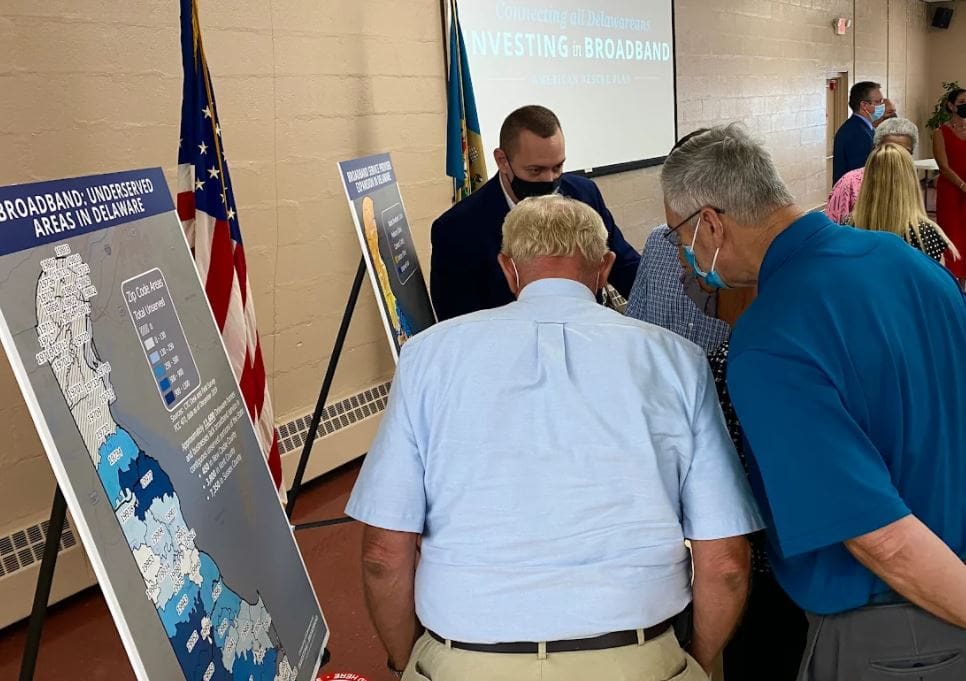

Sussex County legislators gather to look at broadband maps. Clockwise from top, Sen. Brian Pettyjohn, Rep. Jesse Vanderwende, Rep. Ruth Briggs King, Rep. Charlie Postles and Sen. Dave Wilson.
COVID-19 funds will pay for a $110 million Delaware investment aimed at guaranteeing high-speed broadband internet access for every home and business in the state.
The expansion project, announced Thursday by Delaware lawmakers in Bridgeville, will be paid for using funds allocated by the American Rescue Plan Act.
Delaware received nearly $1 billion from the federal stimulus package.
Gov. John Carney said that the “digital divide” became especially apparent during the pandemic.
“One of the things that we have learned over the last year and a half is something that we already knew, which is increasingly, broadband internet access is important to our families, our students and our businesses,” Carney said. “We have deserts across our state, particularly here in Sussex County.”
Carney said that because internet access has become so integral to modern life, he decided to make the $110 million project his first major announcement relating to ARP funds.
Currently, about 11,600 Delaware homes and businesses lack access to high-speed broadband service. Delaware had 443,195 homes, as of 2019.
The broadband infrastructure project will target investments to areas currently unserved or underserved and will prioritize projects that achieve “last mile” connections to households and businesses.
State Sen. Brian Pettyjohn, R-Georgetown, whose district includes many areas identified as high-speed internet deserts, said the issue was one he became passionate about long before he joined the General Assembly.
“In high density areas it’s pretty simple,” Pettyjohn said. “In a mile, you can get a lot of customers, but here in Sussex County, a mile might get you two people.”
Pettyjohn compared the investment to the Hill-Poage Act of 1949, which authorized the federal government to expand telephone access to rural areas.
“Now we’re seeing that with this next utility — the utility of the 21st century — and that’s broadband,” Pettyjohn said.
Pettyjohn said later that money will be allocated in the form of grants to internet service providers to put in lines. Some money also will go to low-income families to connect to the service.
“If you have a line but you don’t get to the last mile, it’s no good,” said Congresswoman Lisa Blunt-Rochester. “If you have one to the last mile, but a kid doesn’t have a laptop, it’s no good.”
Blunt-Rochester said the ARP funds have presented Delaware with a “once in a generation opportunity.”
For her, access to high-speed internet is a matter of equity.
“All of us — Democrats, Republicans, independents, black, white — whatever you are, wherever you come from, we are connected,” Blunt-Rochester said. “To me, broadband is part of that connection.”
In rural areas, high-speed internet access has uses that urbanites might not consider.
Farmers rely on the internet to conduct their business too, explained Rep. Jesse Vanderwende, R-Bridgeville.
“As a business person on the agriculture side of things, I can pull out my cell phone, and I can check on my poultry houses, I can monitor where the harvesters are in the field as we speak and I can also look at my irrigation systems to make all that technology come together be profitable for us as a family, as a business and as an industry,” Vanderwende said.
Vanderwende said rural communities like the one he represents “need this last piece to happen.”
Rep. Ruth Briggs King, R-Georgetown, said the pandemic emphasized the need for high-speed internet personally.
When the General Assembly began to conduct the state’s business virtually, Briggs King realized her house wasn’t equipped with internet fast enough to participate.
“I had to go into another office to be able to do that because of the lack of speed and the bandwidth I needed,” Briggs King said. “That was like many other people trying to work from home and trying to bring their kids’ schoolwork into the house.”
She said access to the internet must not be considered a luxury, like cable TV used to be, but a necessity.
During the pandemic, “we saw many people come to their resort homes or second homes in Sussex County, because they were able to work at their business in DC, New York, New Jersey, or wherever,” Briggs King said. “And we had the same thing for many of our local people who work out of the area.”
“It’s a global economy,” Briggs King said. “Every Delawarean should be able to participate in it.”
Share this Post



